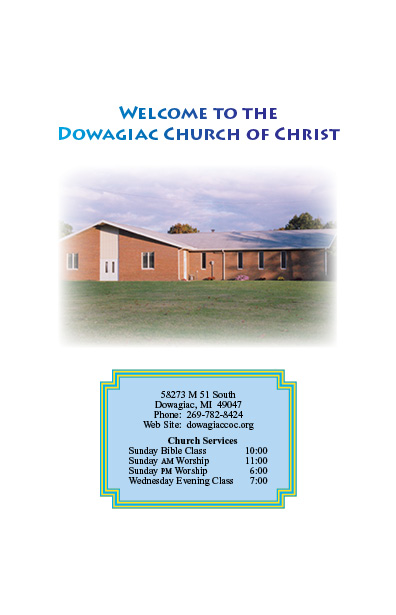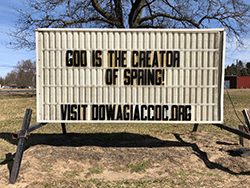Home Worship Services Sermons Location Contacts Bulletins Links |
DUE to the COVID-19 pandemic FAMILY NEWSThis bulletin is distributed in a variety of different ways. It is distributed during our worship services at the church building; it is made available on the web at our dowagiaccoc.org website; and it is sent by e-mail/messaging in connection with our Zoom broadcast invitations. However you receive it, we hope it will be informative and encouraging. We are not a denomination, but a local effort to encourage people to follow what the church was like in the first century. We have no man-made creed and only follow the Bible. We do not have religious titles and do not solicit donations. Come and learn more by visiting with us, e-mailing us, or calling us. POWER FOR TODAY for April, May, and June is available at the church building. BESIDES OUR MEETINGS IN THE BUILDING we have these meetings on Zoom:
REMEMBER OUR CLASS on Wednesday night at 7:00, either here at the building or on Zoom. If you need any of the sheets that go with the class, let John Clayton know (269-687-9426), and he will mail them to you. Richard Hoyt is doing an exhaustive study of the history of Israel, and we all need to learn more about what happened and what implications it has for us. HIGHWAY CLEAN UP APRIL 17: please mark April 17 as our opportunity to clean up the road in front of our building. This is a great community service, and we just need a good turn out to spend a few hours on a Saturday morning picking up trash on the road. More information is coming. TODAY'S LESSON
I. INTRODUCTION — Matthew 21:1-11
A. Christian denominational world celebrates this event.
II. THREE BASIC LESSONS FOR US TODAY
1. Beginning of “Holy Week” leading to Easter
B. Lots of symbolism in this week
2. Many Catholic traditions revolve around this week. 1. Palms — symbol of victory, triumph
C. Amazing fulfillment of prophecy — Zechariah 9:92. Donkey — animal of peace (horse was war) D. Jesus spent Saturday night in Bethany. 1. John 12:1-3 — Mary anoints Jesus for burial.
2. Attempts to kill Lazarus A. There is much symbolism in the biblical narrative.
III. CHALLENGES EACH DAY OF “HOLY WEEK” BRINGS
B. Politicians will stop at nothing. C. People are crazy. A. Palm Sunday — Matthew 21:12-15
1. We must be free of “money changing.”
B. Holy Monday and Tuesday — Matthew 21:17-23
2. Expect resistance from control freak leaders. 3. Get away from things from time to time. 1. Expect challenges to any nontraditional ideas.
C. Spy Wednesday — Matthew 26:14-16
2. Expect skeptics to push the government on you. 1. Selling out does not make you rich.
D. Maundy Thursday — John 13:34; Luke 22:7-14; 13:4-10
2. God knows what is going on. 1. The forgotten/ignored commandment
E. Good Friday — Luke 23:1, 7-11, 33; Matthew 27:57-68
2. The importance of the Lord's Supper 3. The importance of servitude 4. Dealing with catastrophe in life 1. Romans 8:28 — Good only in what it leads to
F. Black Saturday — Luke 23:56
2. Mob violence is irrational. Life goes on even in the face of tragedy. (We lost some audio at the end due to a Zoom problem with our laptop.)
THE BACK PAGEEASTERNext Sunday is “Easter Sunday.” Last week in this bulletin we talked about Palm Sunday, what its history is, and why many of our religious friends talk about Lent and “Holy Week.” Our lesson today expands on those ideas and ends with a discussion of “Good Friday” and “Black Saturday.” It is important to understand that these traditions are the product of Roman Catholicism, and while we can be glad that the world stops and reminds itself about what Jesus taught and endured we do not mandate it as a religious obligation to observe these historical events. Easter Sunday is also a tradition that is not commanded by God and is full of denominational tradition. The word “Easter” comes from “Eostre” who was a pagan goddess in England who was celebrated at the beginning of spring. The celebration of Jesus' resurrection was called “Resurrection Sunday” until the Catholic church saw advantages in linking it to Eostre, and so the name “Easter” was given to the celebration. We know that the resurrection took place after the Jewish Passover and was called “Pascha” in the early church (Greek for Passover). Every culture has had interesting traditions that have been developed. German Lutherans began the tradition of the Easter Bunny, a judge of the behavior of children, very much like Santa Claus. Many people gave up eggs for Lent and so eggs were preserved by hard boiling them and encasing them in wax. This led to decorating the eggs. Eastern Orthodox believers dyed the eggs red remembering the blood of Christ. The tragic side of all this is that for many people the celebration of the resurrection of Christ from the dead is a once a year celebration. We celebrate that resurrection every Sunday, and next Sunday we will talk about why we do that. Read Luke 22:13-20; Matthew 26:26-30; and Mark 14:22-25 to understand what Jesus commanded. — John Clayton Our sign by the street! Sign saying from www.sayingsforchurchsigns.com. Scripture links/references are from BibleGateway.com. Unhighlighted scriptures can be looked up at their website. www.dowagiaccoc.org |

